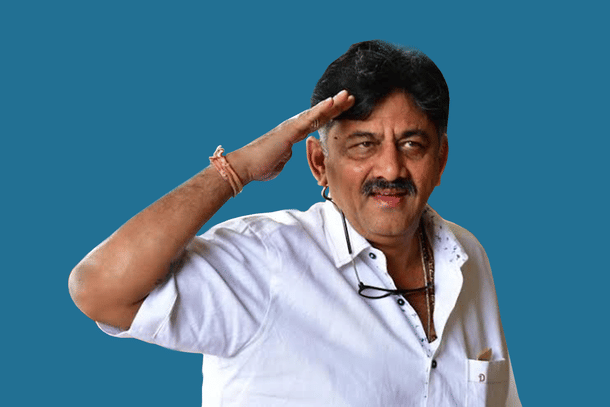News Brief
Curating Karnataka Congress 2.0 Is The Task At Hand For New KPCC Chief D K Shivakumar
Harsha Bhat
Mar 12, 2020, 04:24 PM | Updated 04:24 PM IST
Save & read from anywhere!
Bookmark stories for easy access on any device or the Swarajya app.


Soon after crisis struck Madhya Pradesh Congress, the party pulled up its socks and fixed its party chairs down south. Troubleshooter D K Shivakumar, who was a top runner for the post, has been swiftly appointed Karnataka Pradesh Congress Committee (KPCC) president on Wednesday (11 March).
The appointment of a new chief to the Congress state committees in both Karnataka and Madhya Pradesh have been on the cards for months now. But factionalism and infighting within the party and parallel power centre in both states had left the organisational top structure in limbo.
Jyotiraditya Scindia had been for long touted as the next Madhya Pradesh Congress Committee president. His supporters had for long been demanding his elevation to the post, which is currently held by Chief Minister Kamal Nath. But simmering differences finally resulted in the exit of Scindia along with his loyalists, who tendered their resignations.
But the Congress party could not afford to let the losses multiply or affect the morale of party workers in states without leaders. So as soon as Scindia’s exit from the party was announced, the central Congress leadership announced its new rung of leaders both in Delhi and Karnataka.
The KPCC president’s post has been lying vacant since Dinesh Gundu Rao quit in December 2019. Rao along with CLP leader and former chief minister Siddaramaiah had put in their papers after the party’s dismal performance at the by-polls to 15 seats in Karnataka.
While the news of Shivakumar’s appointment kept making rounds, there were also rumours of Siddaramaiah trying to get it.
The party balanced the power politics by announcing Jarkiholi, a close aide of Siddaramaiah, as one of the three working presidents along with Eeshwar Khandre, a Lingayat, and Saleem Ahmed.
Siddaramaiah, meanwhile, will continue as the CLP chief and leader of the opposition.
But Shivakumar’s appointment to the party’s top post in the state is being seen as the much needed boost to resurrect the party, which has been reduced to a minority especially after the by-polls.
In the Lok Sabha polls, the only seat that the party could retain was that of Shivakumar’s brother D K Suresh.
A strong Vokkaliga leader, Shivakumar’s loyalty has been hailed as one of the virtues that helped him win the party’s trust while keeping the party intact every time crisis struck.
Although there have been claims that he was earlier invited to join Bharatiya Janata Party in the state, he has displayed his allegiance to Congress and the Gandhis by jumping into action every time the party was in crisis.
Be it hosting the Gujarat MLAs in 2017, or safeguarding their own in the previous attempt at ‘Operation Kamala’, Shivakumar is seen as a leader who is willing to put in whatever it takes, be it men, money or might to keep the party united.
Attempts to prevent defection at both instances were completely micromanaged by Shivakumar, who not only kept the MLAs holed up in a resort in his brother’s constituency, but also landed up in Mumbai when MLAs took off the second time around.
Although BJP leader B S Yediyurappa did manage to pull it off with the ‘rebel’ Congress leaders repeating the defection by joining the BJP and winning the by-polls, Shivakumar fought tooth and nail to save the coalition.
The 57-year-old leader from Kanakpura, popularly called the ‘Kanakpurada bande’ (rock of Kanakpura) has been with the party since his student days.
His first election in 1985 saw him contesting against H D Deve Gowda in Sathanur in Kanakpura who he lost to by a very small margin. But he won from the same place in 1989. Later he went on to become one of the youngest ministers of the state at 29 as part of the S Bangarappa cabinet.
That he has risen as a formidable Gowda leader was evident with the support he garnered after he was arrested by the Enforcement Directorate in a money laundering case last year.
The case was painted in caste colours by the Congress as an attempt to snub a Vokkaliga leader by the BJP and saw Janata Dal (Secular) or JD(S) leaders (then coalition partners) too vouch for the same.
Shivakumar’s temple runs, unlike that of his party top gun Rahul Gandhi have been a regular phenomenon as he has also been wearing his ‘temple-going’ Dharmic self on the sleeve.
Although Siddaramaiah is a force he will have to battle, given the pan-community connect that the former JD(S) leader has, thanks to the Janata Party association, if Shivakumar can work to win back the 120 seats where the Congress has lost this time around, he would fare well.
At a time when the JD(S) is almost in tatters in the state, the rise of Shivakumar as the next big Vokkaliga leader, his ‘secular’ politics of facilitating the erection of the tallest statue of Jesus Christ, his popularity with young leaders and party cadre are all strong points that the leader and the party can now cash in on to resurrect the Congress and its fortunes in the state.
Harsha Bhat is an author, linguist, content strategist, and a compulsive chronicler of Bharat's civilisational heartbeat.





